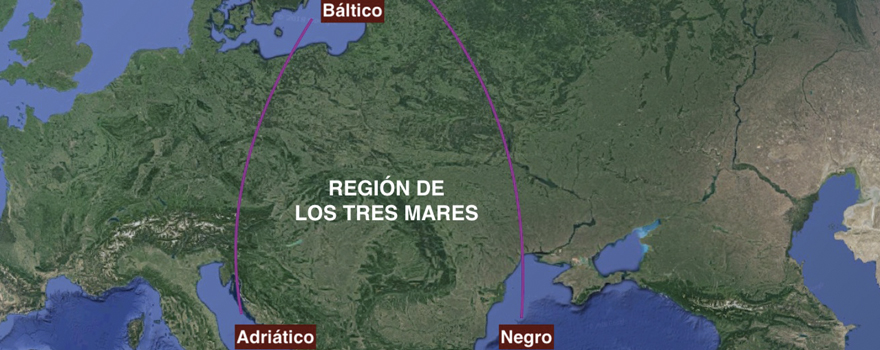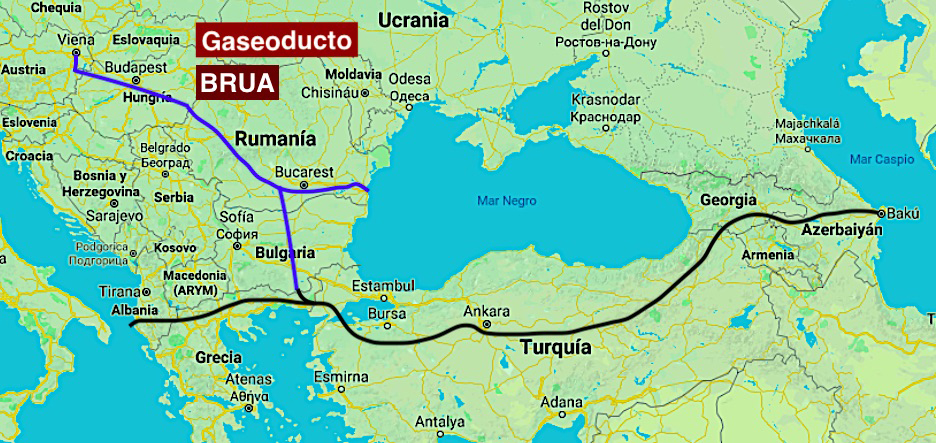Ruta de navegación
Menú de navegación
Blogs
Entries with label brua gas pipeline .
Poland-Germany struggle to gain influence in the European region between the Baltic, the Adriatic and the Black Sea
The latest summit of the Three Seas Initiative (TTI) was attended by the president of the European Commission, which sample was an endorsement from Brussels that did not seem complete until now. German representatives also attended attendance , although Germany is not part of the twelve-nation club of Central and Eastern European countries. Poland, backed by the United States, wants to lead the ongoing effort to reduce the region's energy dependence on Russian gas; in reaction, Germany has announced a timid bid to import liquefied gas from the US.

article / Paula Ulibarrena
On 17-18 September 2018, the third summit of the Three Seas Initiative took place in Bucharest, aiming at the economic development of the area of the European Union (EU) between the Baltic, Adriatic and Black Seas. The meeting was attended by nine heads of state, two presidents of national parliaments, a prime minister and a foreign minister, along with several senior European officials, led by European Commission President Jean-Claude Junker, and a large German representation, as well as US leaders.
The Three Seas Initiative (BABS-Initiative: Baltic, Adriatic, Black Sea) was launched in 2015 and consists of twelve countries: Austria, Bulgaria, Croatia, Czech Republic, Estonia, Hungary, Lithuania, Latvia, Poland, Romania, Slovakia and Slovenia.
According to the Polish Foreign Affairshigh school , the EU's initial reticence about the MTI seems to have been overcome, as the summit was endorsed by the European Commission and the European Parliament's Commissioner for Regional Policy. This recognises the role of the MTI in cohesion and in strengthening the EU.
The importance of energy supply
One of the main aspects that the ITM deals with is energy. Its goal is to have agile access to energy, but also to ensure supply from various points, so as not to depend on a single provider, and also to try to play a diversifying role in supplying other European regions. At present, its efforts are mainly focused on the so-called project BRUA, which aims to open up the possibility of transporting gas from the Caspian Sea area to Romania's southern border, and from there to Romania's north-western border with Hungary.
BRUA is an acronym for Bulgaria, Romania, Hungary and Austria, and aims to diversify the natural gas supply system in the region. "We are creating a distribution network ," said Miguel Arias Cañete, European Commissioner for Energy and Climate Change, "it is not just a big classical pipeline but small reverse flow pipelines that allow gas to be sent south, east, west, so the region will have more sources of energy and cheaper energy.
The BRUA pipeline would be, to some extent, a replacement for the failed project Nabucco. This project consisted of the development of a natural gas transport capacity between existing interconnection points with the natural gas transport networks of Bulgaria (at Giurgiu) and Hungary (Csanadpalota), through the construction of a new pipeline with a total length of 550 km, on the route Giurgiu-Podisor-Corbu-Hurezani-Hateg-Recas-Horia, and three compressor stations located along its route (at Corbu, Hateg and Horia). It planned to reach a gas flow of 4.4 million cubic metres per year in the direction of Hungary, and 1.5 million cubic metres to Bulgaria.
The BRUA pipeline will only account for a third of the flow that Nabucco would have provided, thus minimising the risk of market loss for Russia. The route, which crosses Romania from east to west and from north to south, is estimated to cost a total of €560 million. Romania anticipates that the Black Sea exploration activities of OMV Petrom ExxonMobil could lead to the finding of new natural gas fields. To this end, it is envisaged to extend the BRUA pipeline by a further 300 kilometres from Giurgiu to the Black Sea perimeters.
Germany sent its foreign minister to the summit as an observer. Germany's interest is to strengthen its economic presence in the eastern region of the EU in order to prevent the growing weight of China, secure its energy supply and play an important role in the network gas distribution within Europe, in a context of conflict over Russian gas supplies, and the dependence that this entails for European countries. The construction of the second North European pipeline, known as project NS2 (Nord Stream 2), which will carry liquefied gas from Vyborg (western Russia) to Greifswald on the Baltic coast of Germany, is currently being finalised. civil service examination This project has always been opposed by the United States, which dislikes the EU's energy dependence on Russia, which is why the US is inclined to promote the ITM as area of development and entrance of energy sources that are not dependent on Russia.
|
BRUA pipeline, marked in blue, and TANAP (Turkey) and TAP (connection to Greece) pipelines, both in black, on an image taken from Google Maps. |
Poland comes into play
Poland is aligning itself with the US and trying to reduce Eastern European countries' economic and energy dependence on Russia. But it is also trying to reduce Germany's weight in the region; this is reminiscent of the Intermarium that Poland promoted in the years between the two world wars. Poland's aim is to become a new gas distribution hub for the EU, where its ports would be used for the unloading of liquefied natural gas of US origin. These ports would be connected to the project BRUA, replacing Ukraine as entrance of gas to the EU and in turn replacing Russian gas with US gas (9).
Precisely this project of the ITM, together with pressure from the US president, has provoked a reaction from Berlin. German Chancellor Angela Merkel counterattacked in October with the advertisement that Germany is once again opening the door to US gas by deciding to co-finance the construction of a 500 million euro liquefied natural gas ship terminal in the north of the country. This would strengthen Germany's alliance with the US, but could also reduce its dependence on nuclear energy and greenhouse gas emissions.
The TTI projects are financed by a financial fund provided by six of the member states (Croatia, Czech Republic, Poland, Romania, Slovakia and Latvia), but open to the participation of all the countries that make up the group. Its goal is to provide financial support for the development of trans-national infrastructures in which at least three ITM member states participate. The institutional contribution exceeds 5 billion euros, and aims to attract external investment, from private funds, to strengthen the fund itself. With a thirty-year perspective, the aim is to exceed 100 billion euros.

